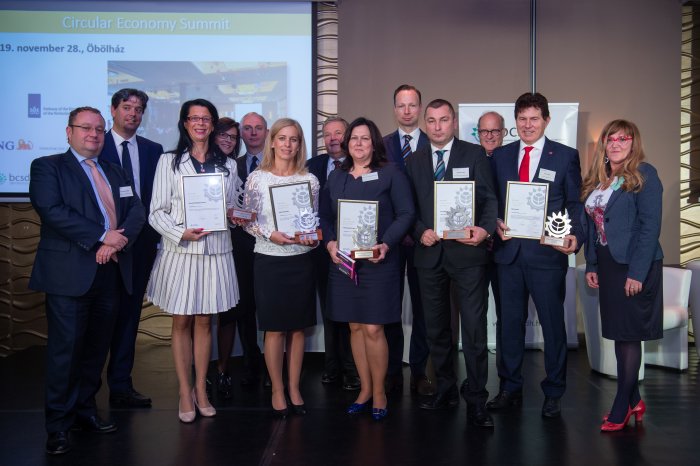Sustainability and Positivity Trump Profitability: Schmidpeter

Photo by BCSDH
Creating sustainable values and having a positive impact on society are just as important, if not more so, than profitability, Professor Dr. René Schmidpeter told delegates at a Business Council for Sustainable Development in Hungary business lunch that focused on climate adaptation and water.
Winners of this year’s BCSDH “For a Sustainable Future” Awards.
“Executives of the world’s largest companies are fundamentally questioning the former ‘corporate value/shareholder value’ business paradigm,” said Schmidpeter, director of the Center for Advanced Sustainable Management, and general secretary of the World Institute of Sustainability and Ethics (WISE).
An internationally acknowledged expert on CSR, ethics and sustainability, Schmidpeter is a regular guest professor at Nanjing University of Finance and Economics in China. He is also an associate professor at Murdoch University in Perth, and an honorary professor at Metropolitan University in London.
Much of what he spoke about required applying a different way of thinking about information we already have. He asked his audience what the breaks on a car were for. When he got the expected responses of for safety and slowing down, he suggested they were actually there to help the car go faster overall, and quoted Ferdinand Porsche as saying “Our cars must have the best brakes.”
He said it was now well accepted that sustainable companies could see a financial return on investment, but argued there was still a need for a mental shift.
“Given the current global social and economic challenges, we need to think about the future as consistently as we did after World War II,” he challenged his influential audience. The BCSDH has 90 member companies that contribute approximately 30% of Hungary’s GDP
“Companies have to realign their business models, minimizing any negative effects and keeping the positive effects for society as high as possible. The more positive the impact, the higher the entrepreneurial return. More and more top executives are realizing that these far-reaching environmental and social changes are leading to unpredictable risks but, at the same time, are also creating unforeseen business opportunities.”
For once, though, the Old Continent seems ahead of the pack. “Europe could be a global leader in this field,” Schmidpeter said, and claimed that American leaders are coming to Europe to learn how to create an “eco-social” market economy.
CSR was largely bought to Hungary by the multinationals operating here importing their own best practice. The Budapest Business Journal asked the professor if this poses problems with cementing the idea of CSR in a local society?.
“It is important that CSR is developed from inside-out; this means every economic area has to develop its own understanding and a concept of sustainability which fits to its own cultural background,” he said.
“Of course, large corporations are important for international economic developments, but at the same time local small- and medium-sized enterprises play a key role when it comes to national economic transformations. It is important that large enterprises and SMEs cooperate and develop sustainable value chains and innovative products and services together. CEOs and decision makers are playing an important role to change the current paradigm of management. It is all about thinking beyond mere profit maximization by fostering purpose of business as well as driving positive impact on our societies,” Schmidpeter added.
BCSDH: Sustainable Water Management Recommendations
“Given the fact that climate change is one of the biggest global challenges and many of its impacts will occur through water, the development of companies’ water management practices can make a significant contribution to climate adaptation processes. There is no company that does not depend on this natural resource,” said Attila Chikán Jr., president of the BCSDH, introducting the council’s three-point recommendation to the business sector for promoting sustainable water management. These are:
1. Elaborate climate adaptation strategies in which water is considered a valuable resource and a risk factor of significant relevance;
2. Implement circular water management practices to reduce the water footprint;
3. Create partnerships in the value chain and operational environment to increase water efficiency and water renewal.
More than 80 CEOs, civil and scientific experts took part in the preparation and wording of the recommendation, Chikán said, looking for solutions for both the business sector and its stakeholders that can positively impact sustainable water management.
Sustainable Future Prize
For the third year the “For a Sustainable Future” prizes were also awarded at the BCSDH business lunch.
“The goal of the prize is to set an example, and moreover, to promote and increase the contribution of business to meeting the [U.N.’s] Sustainable Development Goals,” Irén Márta, managing director of BCSDH and member of the awards jury, explained.
Change Leader Award: László Ilics (Generali Insurance Co.)
Leading Women Award: Nóra Horváth-Magyary (K&H Bank); Krisztina Petrényiné Szabó (MOL Group); and Hajnalka Széll (Auchan Hungary).
Best Business Solution prize-winners: Future FM, for implementing a sustainable water management program operated in cooperation with building stakeholders; and Heineken for its “Hoping for a better future project”, a program that promotes domestic, locally sourced production of hops and boosts employment in rural areas.
SUPPORT THE BUDAPEST BUSINESS JOURNAL
Producing journalism that is worthy of the name is a costly business. For 27 years, the publishers, editors and reporters of the Budapest Business Journal have striven to bring you business news that works, information that you can trust, that is factual, accurate and presented without fear or favor.
Newspaper organizations across the globe have struggled to find a business model that allows them to continue to excel, without compromising their ability to perform. Most recently, some have experimented with the idea of involving their most important stakeholders, their readers.
We would like to offer that same opportunity to our readers. We would like to invite you to help us deliver the quality business journalism you require. Hit our Support the BBJ button and you can choose the how much and how often you send us your contributions.









